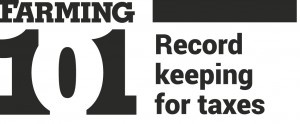Everyone in business, including farmers, must keep appropriate records, but record keeping is especially important when it comes to preparing taxes.
1Monitor progress
You need records to monitor the progress of your farming business. Records can show if your business is improving, which items are selling, or what changes you need to make. Records can help you make better decisions that may increase the likelihood of business success.
2Financial statements
You need records to prepare accurate financial statements. These include income (profit and loss) statements, cash flow statements, and balance sheets. These statements can help you deal with your bank or creditors and help you to manage your farm business.
3Receipts source
You will receive money, property, and/or services from many sources. Your records can identify the source of your receipts. You need this information to separate farm from nonfarm receipts and taxable from nontaxable income.
4Deductible expenses
You may forget expenses when you prepare your tax return unless you record them when they occur.
5Prepare returns
You need records to prepare your tax return. For example, your records must support the income, expenses, and credits you report. Generally, these are the same records you use to monitor your farming business and prepare your financial statements.
6Support reported items
You must keep your business records available at all times for inspection by the IRS. If the IRS examines any of your tax returns, you may be asked to explain the items reported. A complete set of records will speed up the examination.
7Cash accounting
Most farms use the cash method because farmers find it easier to keep records using this method. Cash accounting is an accounting method where receipts are recorded during the period they are received, and expenses are recorded in the period that they are actually paid.
8Accrual accounting
Under and accrual method of accounting, you generally report income in the year earned and deduct or capitalize expenses in the year occurred. This method records revenues and expenses when they are incurred, regardless of when cash is exchanged.
The term “accrual” refers to any individual entry recording revenue or expense in the absence of a cash transaction. The purpose of an accrual method is to correctly match income and expenses.
Source: Farmers’ Tax Guide 2016.
(Farm and Dairy is featuring a series of “101” columns throughout the year to help young and beginning farmers master farm living. From finances to management to machinery repair and animal care, farmers do it all.)
More Farming 101 columns:
- 5 tips for post-harvest storage
- 7 tips for family meetings on the farm
- 4 tips for balancing your farm and family
- 4 tips for communicating on the family farm
- 4 tips for firing an employee
- 6 tips for keeping good farm help
- 4 tips for recruiting farm labor
- 5 general farm labor laws
- 4 tips for employing minors
- 4 tips for PTO safety
- 5 things young farmers should know about finances
- The farm balance sheet
- 5 items for your farm’s cash flow statement
- Personal and business records: Keep them separate
- What to include in your farm business plan
- How to approach a lender: Tips for getting a farm loan
- How to use microloans to get your farm started
- Saving for the future: 6 tips for young farmers
- How to create a farm safety kit
- 5 tips for child safety on the farm
- 4 tips for transporting livestock
- 5 ways to better understand tractor stability
- 6 farm equipment hacks













